« Reply #262 on: October 15, 2017, 10:34:22 am »
The film is on the side of disclosure, surrender and surviving the consequences. Elio’s father advises his son not to “make yourself feel nothing so as not to feel anything”. It never preaches control. Armie Hammer says quietly, as if it settled every argument: “The heart wants what the heart wants.” https://www.theguardian.com/film/2017/oct/15/armie-hammer-timothee-chalamet-call-me-by-your-name-interview
https://www.theguardian.com/film/2017/oct/15/armie-hammer-timothee-chalamet-call-me-by-your-name-interview The ObserverHammer & ChalametCall Me by Your Name'sOscar-tipped double act on their summer of loveFilm critics are raving about the new gay romance. Armie Hammer and Timothée Chalamet
The ObserverHammer & ChalametCall Me by Your Name'sOscar-tipped double act on their summer of loveFilm critics are raving about the new gay romance. Armie Hammer and Timothée Chalamet
talk about filming in Italy, fathers – and their relationship on and off setby Kate Kellaway
Sunday 15 October 2017 03.00 EDT 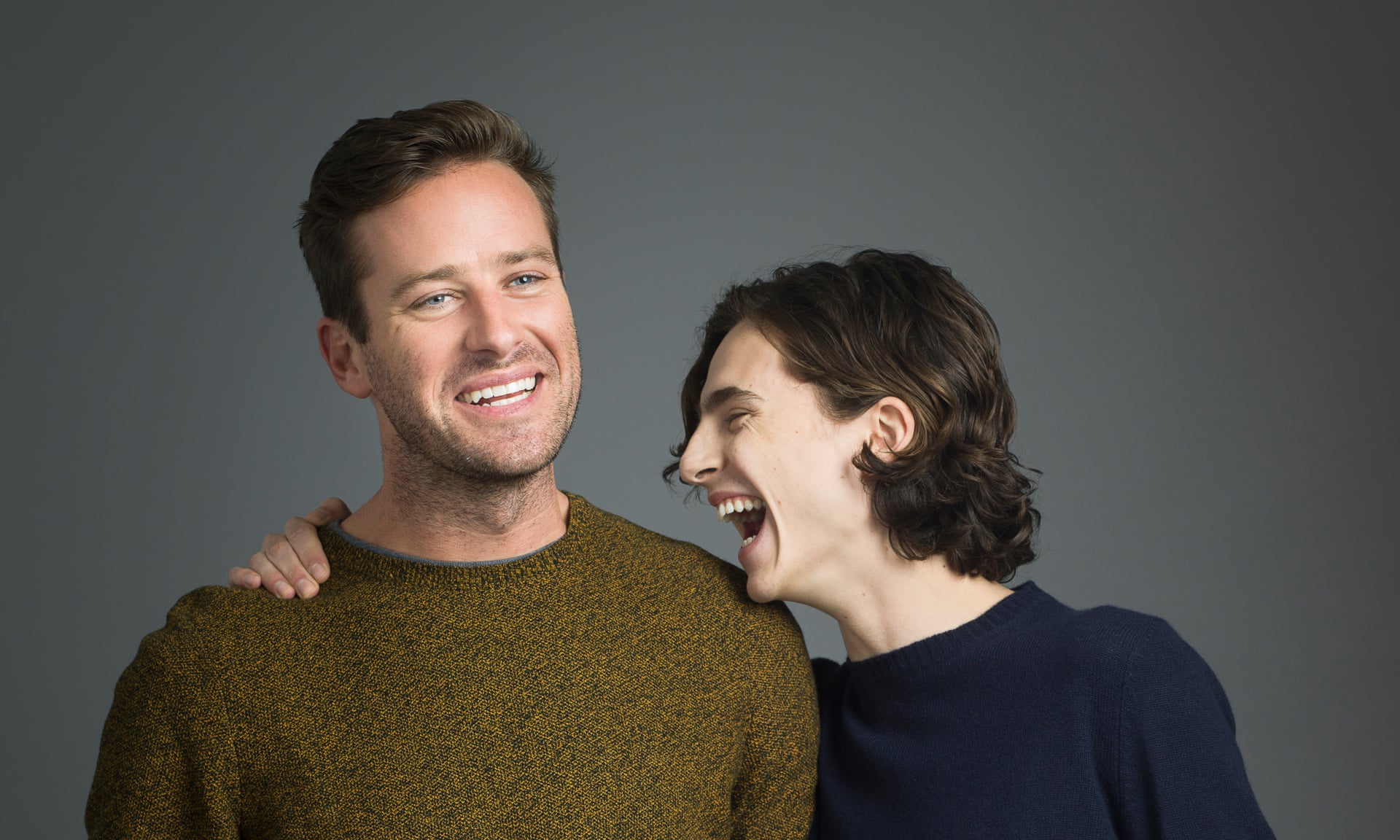 Side by side, looking relaxed, receptive, en rapport: Armie Hammer and Timothée Chalamet in Call Me by Your NameWhen a film is as extraordinary as director Luca Guadagnino's Call Me by Your Name, you suspend disbelief. It becomes impossible not to imagine that its characters, 24-year-old Oliver (Armie Hammer), a doctoral student working for a professor of Greco culture in northern Italy, and 17-year-old Elio (Timothée Chalamet), the professor’s son, are not out in the world somewhere. You picture them now the film is over, continuing to live their lives and picking up the pieces after the devastating love affair that brought them together in 1983. For although we have arrived at a moment in cinema history where – at last – there are more remarkable cinematic accounts of homosexual love than ever before (Barry Jenkins’s Moonlight, Francis Lee’s God’s Own Country, John Trengove’s The Wound), this film occupies a subtle category of its own. It is an adaptation, by James Ivory and Walter Fasano, of André Aciman's 2007 celebrated novel, described by the New York Times as “hot” and “a coming-of-age story, a coming-out story, a Proustian meditation on time and desire”.
Side by side, looking relaxed, receptive, en rapport: Armie Hammer and Timothée Chalamet in Call Me by Your NameWhen a film is as extraordinary as director Luca Guadagnino's Call Me by Your Name, you suspend disbelief. It becomes impossible not to imagine that its characters, 24-year-old Oliver (Armie Hammer), a doctoral student working for a professor of Greco culture in northern Italy, and 17-year-old Elio (Timothée Chalamet), the professor’s son, are not out in the world somewhere. You picture them now the film is over, continuing to live their lives and picking up the pieces after the devastating love affair that brought them together in 1983. For although we have arrived at a moment in cinema history where – at last – there are more remarkable cinematic accounts of homosexual love than ever before (Barry Jenkins’s Moonlight, Francis Lee’s God’s Own Country, John Trengove’s The Wound), this film occupies a subtle category of its own. It is an adaptation, by James Ivory and Walter Fasano, of André Aciman's 2007 celebrated novel, described by the New York Times as “hot” and “a coming-of-age story, a coming-out story, a Proustian meditation on time and desire”.
On an ordinary, autumnal afternoon, it seems far-fetched that Hammer and Chalamet should be at Claridge’s in London, that they should be available for comment or that they should, after all, turn out to be actors. As the door opens on their hotel suite, it is Oliver and Elio I search for in their faces. Hammer, known for his performance as the Winklevoss twins in David Fincher’s The Social Network, is so good looking it is almost laughable – blond, sportily built, with perfect American teeth. What makes his performance stirring is the sense he gives of beauty as a trap. There is a restlessness about Oliver, subtle hints of unhappiness, as if he needed to disrupt his own veneer.
Chalamet looks like a streetwise romantic poet in big, black, lace-up boots, white shirt, burgundy velvet jacket. As Elio, he is bolshie, vulnerable, infatuated – no dandy. This is his breakthrough role and he is rightly being talked about as an Oscar contender (although Hammer is too). Chalamet, who has previously appeared in Homeland and Christopher Nolan’s Interstellar, is in Call Me by Your Name as intense as a Modigliani portrait – a dark, gangly, Jewish youth, a mix of inexperience, volatility and precocity. He can speak English, French and Italian. He plays the piano. He wins intellectual arguments. But he does not know how to cure a broken heart.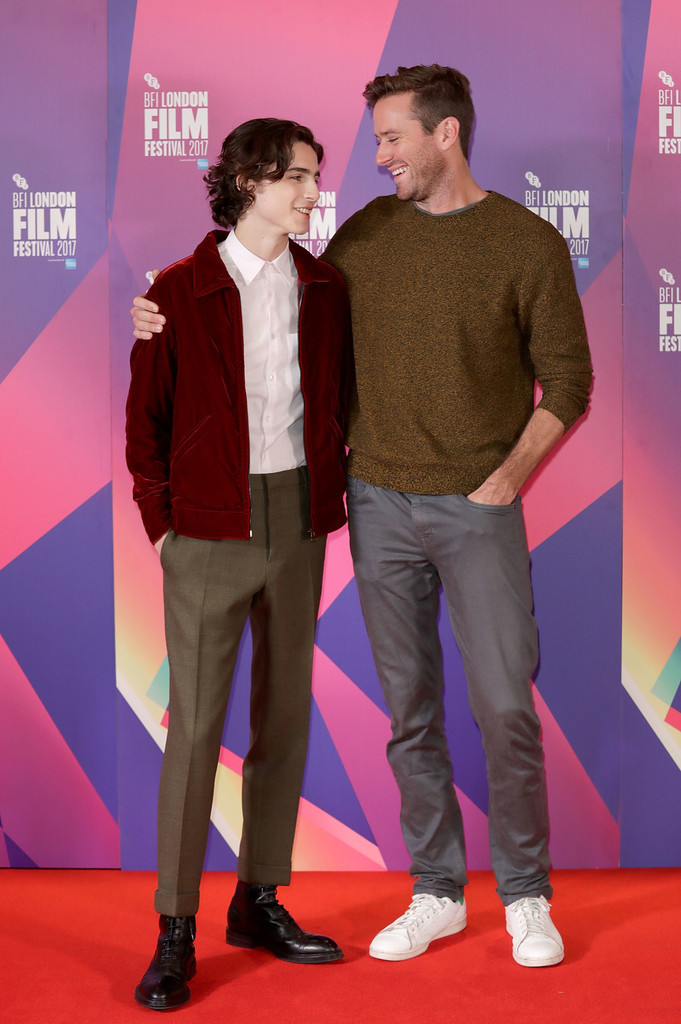
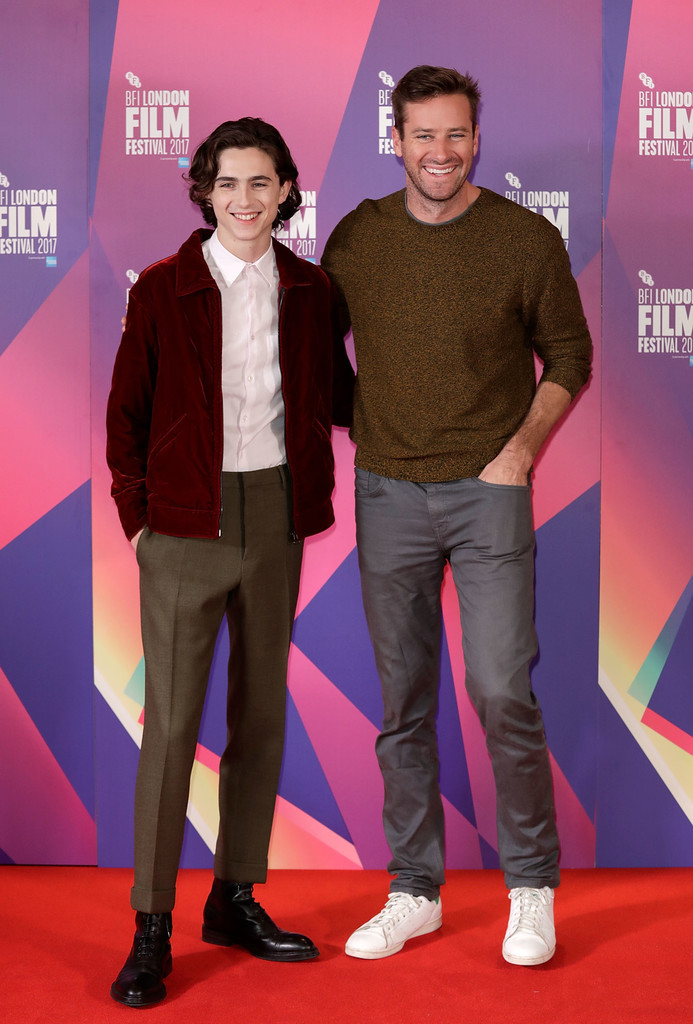
The actors sit in armchairs, side by side, looking relaxed, receptive, en rapport. Hammer, evenly tanned, has his feet up on a coffee table. His hands hang off the armrests like floppy paws. Chalamet is more contained. The film was shot in the summer of 2016 over four months, in the medieval town of Crema, Lombardy, where Guadagnino has an apartment in a crumbling palazzo, not far from where they were shooting. When Oliver turns up at the professor’s villa, he asks: “What does one do around here?” Elio replies languidly: “Wait for the summer to end. Read books, transcribe music, swim in the river.”
It is on the subject of summer romance that our conversation begins. Living in L.A., Hammer says, can feel like an endless summer holiday. “In that sense, all my romances have been holiday romances,” he laughs, but adds that his summer holidays were untidily defined because: “I dropped out of academia.” It is almost the first thing he volunteers – and it is impossible to miss his disarming insecurity, even though he is, on the face of it, as you would expect, more assured than his companion.
Hammer is married to TV journalist and former model Elizabeth Chambers with whom he has two children – a three-year-old daughter and baby son – and he has never been shy of talking about his wooing style. He simply told his wife-to-be to drop her then boyfriend. He explained that she was made for him, he for her. He tells me now: “My wife is four years older than I am – I’m sure she thinks I am an immature child.” Child or no, the man is direct – he has bounce. His approach to Chambers could not be more different from the film’s glancing courtship.
Chalamet has claimed to be working too hard for dalliance but when he was 17, the same age as Elio, he was gossiped about in connection with Madonna’s daughter Lourdes. With a little flash of a smile, he stresses that he has never had a summer of an intensity to rival the one in the film. Hammer interjects to admit that he has experienced heartbreak and then turns to Chalamet, who, at 21, is 10 years his junior, with a big-brother smile as if to egg him on to confession.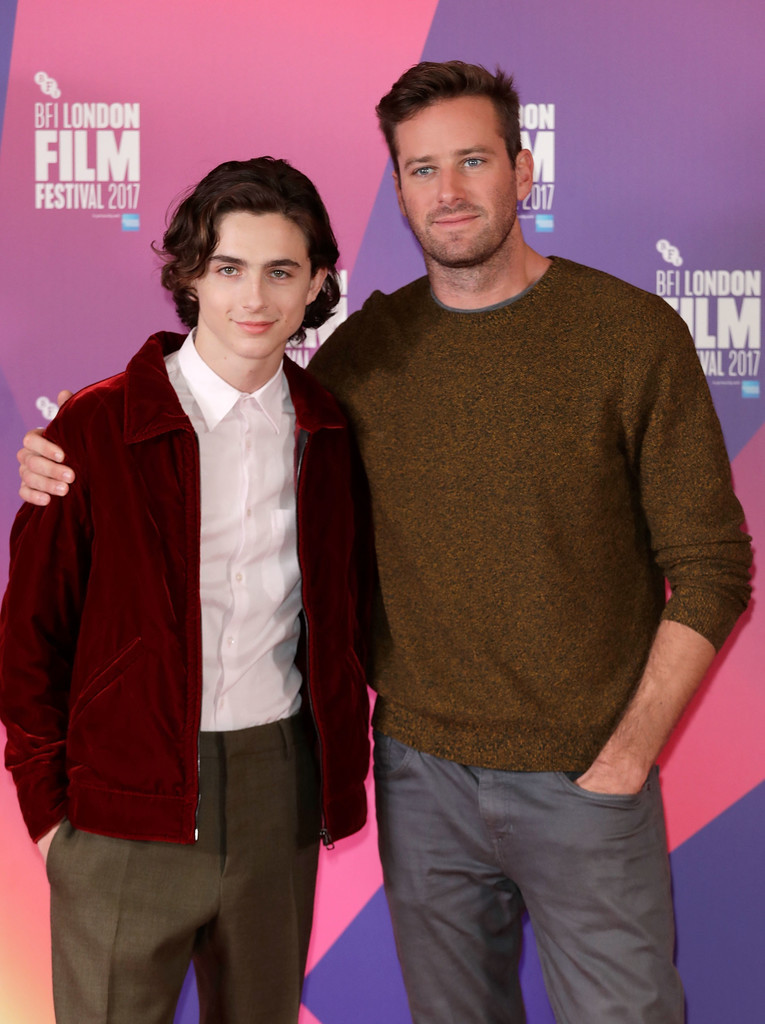
The film is set in the 80s, when coming out was harder, and Sayombhu Mukdeeprom’s seductive camera work is deliberately dated: a holiday snapshot, bleached and sultry. The casual corner-of-the-eye shots enhance naturalness, as if the cameraman were dreaming. There are no golden syrupy moments. This is to be a summer of love without fakery. Hammer has been repeatedly asked in interviews how the film compares with Brokeback Mountain (still seen as a gay landmark more than 10 years on) and replies that there is no comparison. He makes it clear that gay love stories on screen are no longer the sensational exception and emphasises that Call Me By Your Name is about desire in a universal sense.
It is the way in which desire between Oliver and Elio is choreographed that is the film’s greatest achievement. It is, in its way, as erotic as Blue Is the Warmest Colour – though less explicit (with the exception of the scene, singled out on the internet, involving a peach – forbidden fruit). But the film is at its most charged before anything happens, without words, before touch, with everything in the balance. How was that tension achieved?
“We had the luxury of three weeks together in advance of filming,” says Chalamet, “so were able to build this chemistry naturally. Sometimes, when you act with someone in an intimate capacity, you have to ask vulnerable questions to speed up intimacy – but that’s artificial.” Did you ask each other questions? “Yes, slightly,” Hammer interjects. “Yes, no, no…,” Chalamet laughs. “The point is there was no time constraint. I felt I knew Armie so well.” Hammer continues: “The film, unusually, was shot almost entirely chronologically and, with every scene, the intimacy built. It was like foreplay, where you know the excitement is coming and build slowly, slowly, slowly.” Non-verbal signals, he agrees, are the most powerful: “Ninety-eight per cent of all human communication is non-verbal.”
But this was also a film in which Chalamet had to speak English, French and Italian. He is bilingual because of a French father, but had to learn Italian and perfect piano pieces, every day for a month and a half, with teacher/composer Roberto Solci. But once the homework was done, before filming started, the actors were almost on holiday. They revel in the memory of Italian restaurants and Hammer puts in a plug for Via Vai, in Bolzone, outside Crema: “That it does not have three Michelin stars is a crime against the culinary world. It is the only restaurant where I’ve had an eight-hour lunch.” He wants “chef Stefano” to take a bow and renders himself speechless remembering the tripe, caviar and all. Chalamet confesses himself unable to compete, nominates Speranza, an alternative eatery, and apologises: “Armie has tremendous food culture. I just don’t have that.”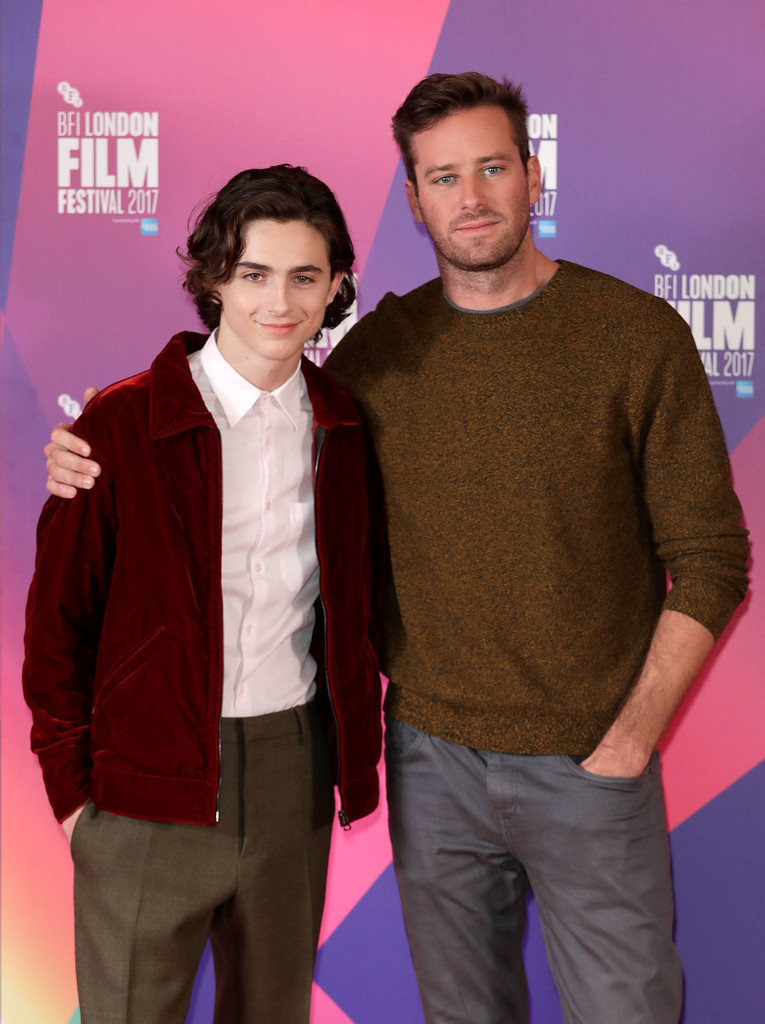
“I was an idiot at 21,” says Hammer and looks fondly at Chalamet, whom he regards as far more mature than he was at the same age. “When you are young you are unencumbered by any sense of knowing other people or yourself – you are free. But being young is confusing because you don’t have a barometer. There was a long period in my life of getting to know myself well.” He was a wild teenager. Did he really set fire to the school lawn by writing his initials in lighter fuel? He pulls a face, looks sheepish. Why was it he and school never got on? “I didn’t like the idea you went there to learn, but that if you asked questions it was thought disrespectful and wrong.” It is no secret his father almost disowned him when he left college to act, it has found its way on to his Wikipedia page. I tell them I want to know about their relationship with their dads.
Hammer blushes. “Timmy, do you want to start? I have to think about this.” Chalamet steps in obligingly: “I grew up in New York [Hell’s Kitchen, Manhattan]. I’m tremendously close to my father, he is a role model, one of the most generous people I know. He worked for Unicef. In a showbiz family, he is my rock. He reminds me of what is important: family and homeostasis.” Slipping a word such as homeostasis into the conversation is typical of this boy – he shares his character’s tormented articulacy. One of his favourite books, he reveals, is The Perks of Being a Wallflower by Stephen Chbosky, “capturing the voice of a young person in a way that felt relatable”. He gave up a place at Columbia [University] after only a year to act. Did his parents disapprove? He hesitates: “My parents were not supportive.” Could he imagine having a conversation like the one Elio has in the film – unusually tolerant, intimate and insightful on the subject of falling in love – with his father? “Yes,” he says loyally.
Armie Hammer is named after his great-grandfather, chairman of the oil company Occidental Petroleum. Born in L.A., he grew up in a “half Jewish” family in the Cayman Islands. His father he describes as an “entrepreneur/businessman”. But being part of a mega-rich petroleum dynasty is not necessarily plain sailing. Was his relationship with his father testing? “Our relationship is great now. What my father impressed upon us is enjoyment of life. He is one of the most charming bastards you’ve ever met in your entire life. He is funny, gregarious, the life of every party, capable of breaking anybody’s outer shell. He loves adventure, free-spiritedness. He is a very big kid.” And there is a difficult side to that? “Sure – a flipside to every coin.” Could he imagine having a conversation like the one in the film with his father? “No,” he says, “no...”, like someone reversing out of a room at top speed.
I suggest to Hammer that what is wonderful about his performance is its restless depth. Oliver at times seems like a clown who has not settled in his own skin. He has a slightly baffling social bumptiousness. Chalamet nods enthusiastically and pitches in: “There’s so much going on with Oliver, particularly when I am sleeping and he is standing at the window – my favourite scene.” Hammer concedes that Oliver does “a lot of masking. Ostensibly, he is the bold one but it is Elio who is brave and who acknowledges what he feels.”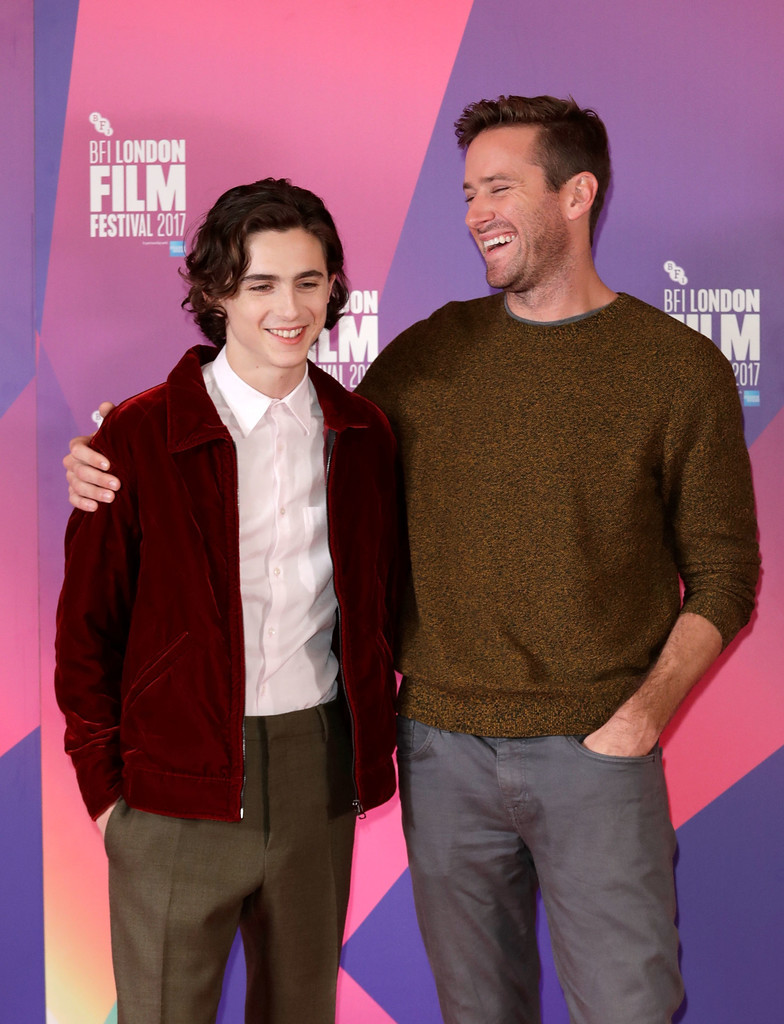
Chalamet meanwhile touches on the importance of doing the opposite: holding back, not squandering your best performance in unfilmed rehearsals (they tended to rehearse in the drawing room of Guadagnino’s palazzo). At this point, I can’t resist asking why they each gave up education for a profession of such insecurity? Chalamet replies, quick as a knife: “It is because of Heath Ledger in The Dark Knight, Philip Seymour Hoffman in Death of a Salesman, Adam Sandler in Punch-Drunk Love, Denzel Washington in Fences on Broadway…” So seeing other people act was the spur? “I saw The Dark Knight when I was 12. I realised: I can’t not act.”
Hammer says: “I also knew what I wanted to do by 12/13 and was obsessed with film. Home Alone made me think: making movies looks like so much fun. I’m a junkie when it comes to acting. When you make a movie, you get to do what you love, you get your fix.”
In the aftermath of this film, it seems certain neither actor is going to be deprived of a fix. Call Me By Your Name should be as much a breakthrough film for Hammer as for Chalamet. He has been in Guy Ritchie’s The Man From Uncle and performed with Julia Roberts in Mirror, Mirror, but not as yet become the A-lister he is cut out to be. He is about to play a “sociopathic CEO” in Sorry to Bother You, and is in On the Basis of Sex – “less salacious than the title would imply, about Ruth Bader Ginsburg, the US supreme court justice”. But there will be bigger roles to come. And it seems there is no stopping Chalamet. He is in Lady Bird, Greta Gerwig’s semi-autobiographical directorial debut, playing one of the boyfriends. The film is already getting standing ovations at film festivals and is out next year. He is also starring alongside Steve Carell in Beautiful Boy, based on David Sheff’s 2008 book about his son Nic’s methamphetamine addiction, and is shooting in New York with Woody Allen in an as-yet-to-be-named movie.
Now, as if to chime in on Hammer’s description of acting as an addiction, Chalamet explains that after acting in John Patrick Shanley’s Prodigal Son in New York for four months and filming Call Me By Your Name for three, he needed a month to “detox”. What does that mean in practice? “I try to stay away from industry-related websites and films. I have to pull myself together,” he says. “You have to reacclimatise,” Hammer concurs.
Do they mourn the end of their Italian summer? “Yes,” they chorus. They acknowledge there will never be another film like it. “It has been overwhelming,” Chalamet says. “It seems to have challenged people to be honest about what they are feeling,” Hammer says and then adds, visibly moved, that he received an email from someone who told him: “I saw Call Me By Your Name and went home and came out to my parents.”
In the film, Elio’s mother reads a fairytale with the moral that it is imperative to speak out in life. But is that always true? “Yes, I think so,” says Hammer. “No, it depends,” says Chalamet. “It is tough. I’d look at motivation: are you speaking for yourself or because you couldn’t lead your life without the other person hearing what you have to say?”
The film is on the side of disclosure, surrender and surviving the consequences. Elio’s father advises his son not to “make yourself feel nothing so as not to feel anything”. It never preaches control. Hammer says quietly, as if it settled every argument: “The heart wants what the heart wants.”
Call Me By Your Name is released in the UK on 27 October
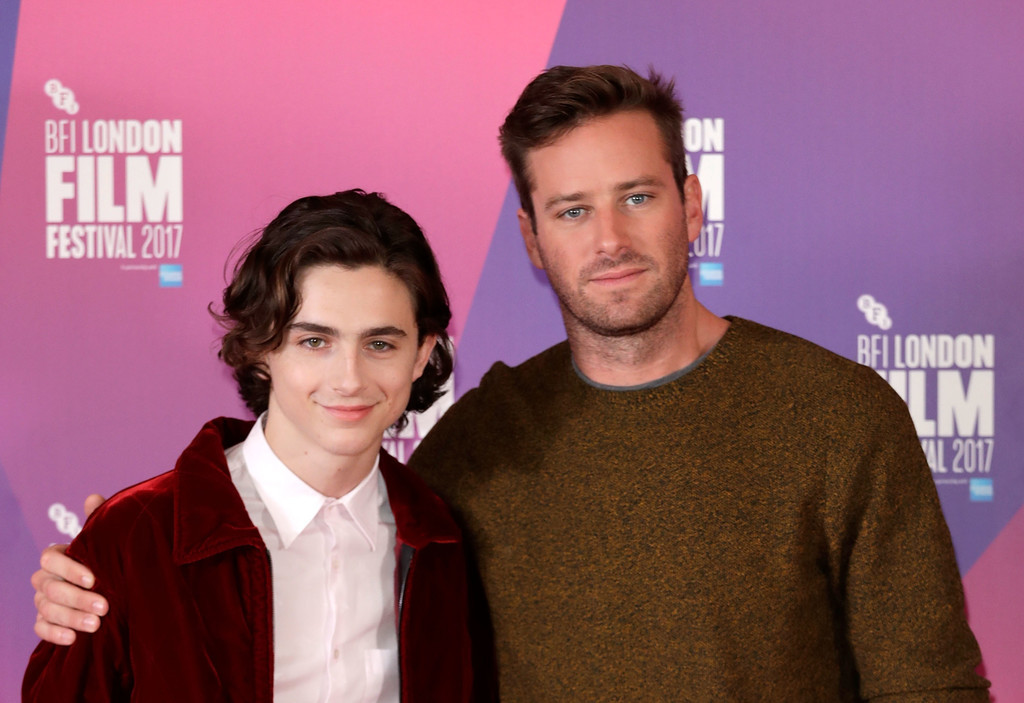
« Last Edit: October 18, 2017, 05:41:59 pm by Aloysius J. Gleek »

Logged
"Tu doives entendre je t'aime."
(and you know who I am...)
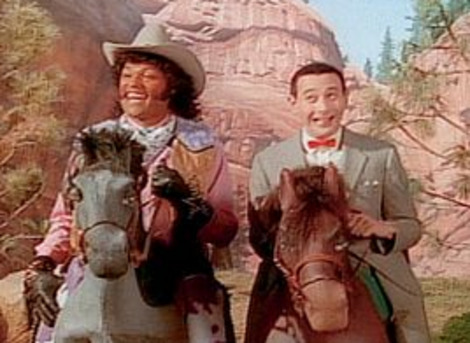
Cowboy Curtis (Laurence Fishburne)
and Pee-wee in the 1990 episode
"Camping Out"